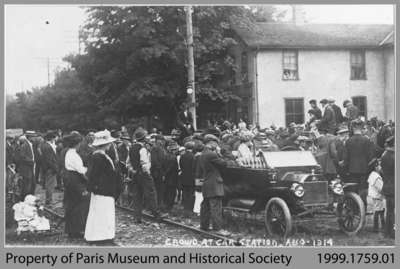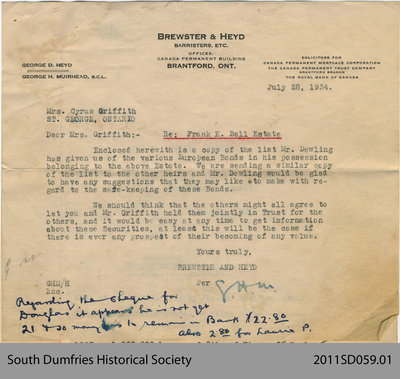
History of the St. George Agricultural Works
Under New Ownership
Pages
The BeginningBenjamin Bell and His EnterpriseThe Agricultural Works Under Frank K. BellAgricultural Works as a Public CompanyUnder New OwnershipAs the spring of 1907 wore on, rumors began flying around St. George that the Works was up for sale. In fact, amidst heavy production runs, the business had gotten itself into insolubility. By June, Frank had declared bankruptcy. The company was placed into receivership. Edward Roper Curzon Clarkson of Toronto acted as assignee for the benefit of the creditors. After some scrambling around for a solution, Frank found a company which would purchase part of the Works. The Ontario Wind, Engine & Pump Co., of Toronto bought a controlling share.
Immediately afterwards, a dispute arose with the village council over taxation. Messrs. Chapman and Fleury, representatives of the new owners, met with the council at the Cummings Hotel. It was their wish that the municipality exempt the manufactory from taxation for one year as an incentive to carry on business in the area. The council agreed to these terms on September 5, 1907. One month later, the company officially became B. Bell & Son Company Ltd. Frank K. Bell retained his position on the board of directors and as the general manager.
From 1909 until the beginning of the First World War, the foundry concentrated on manufacturing its traditional line of agricultural implements. Along with these, specialization occurred in silo-filling technology. Ensilage cutters and blowers were the principle products. Employment leveled out in this period with forty skilled workmen kept busy by January of 1911.
During World War I, many local industries were petitioned by the British War Ministry as to the viability of producing shells and assorted weaponry. The Works bid on a contract to supply shells early in 1915. This contract was received in June. Unfortunately, no one knew how to press shells. Advertisements in Canada and the United States were placed for an experienced man. From these ads, R.F. Judisch of Cleveland, Ohio, an experienced munitions expert, was chosen to fill the post. He acted as an instructor to the workmen. For approximately three years, munitions were the primary output of the factory. Almost all of the shells proved defective and resulted in the company losing a great deal of revenue. Following the war, the Works resumed full production of agricultural implements, with even greater emphasis on ensilage cutters and blowers.
Frank K. Bell passed away on July 22, 1929. He was sixty-three years old and had never been married, so had no children to take over the company. His remains were interred in the Baptist Cemetery alongside family members.
B. Bell & Son Co. Ltd., struggled on for a couple more years operated by the Bell family executors but the company was finally abandoned as uneconomical. It was sold to Cyrus Griffith, John Dowling, and Gordon Conant in the summer of 1933. The buildings were demolished under the authorization of these three men.
Adopted from the original text by Douglas Mannen. Provided by the South Dumfries Historical Society.
Bibliography
Brantford Weekly Expositor
Brantford Daily Expositor
Brantford Courier
Dundas True Banner and Wentworth Chronicle
St. George Public Library Piles
Tweedsmuir History
St. George Museum Records and Displays
Brant County Registry Office
St. George Sentinel Newspaper (1895)
Brant County Business Directories
St. George Old Boys Reunion Publication (1924)
Lynden Old Boys Reunion Publication (1929)
B. Bell & Son Business Cards Farmers Almanac (1903)
Atlas of Brant County
Atlas of Waterloo County (1877)


